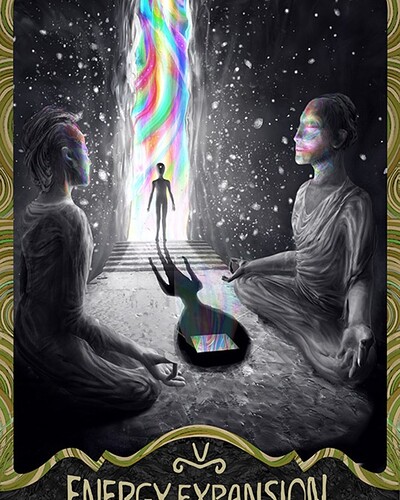SmartGPT on Reiki: Reiki is a Japanese form of energy healing that is based on the idea that there is a universal life force energy that flows through all living things. Reiki practitioners use their hands to channel this energy into the body of the recipient, with the intention of promoting healing, relaxation, and well-being. The word Reiki comes from two Japanese words: Rei, which means “universal,” and Ki, which means “life force energy.”
The practice of Reiki involves the practitioner placing their hands on or near the body of the recipient, in various positions that correspond to different areas of the body. The practitioner then channels Reiki energy through their hands, with the intention of balancing and harmonizing the energy in the recipient’s body. This is believed to help remove blockages and promote healing at the physical, emotional, mental, and spiritual levels.
Reiki is a non-invasive, gentle form of energy healing that can be used alongside other medical or therapeutic treatments. It is often used to complement traditional medicine and can be beneficial for a wide range of conditions, including chronic pain, anxiety, depression, insomnia, and stress.
One of the key principles of Reiki is that the healing energy is intelligent and knows where it is needed most. This means that the practitioner does not need to diagnose or direct the energy to specific areas of the body. Instead, the energy will naturally flow to where it is needed, promoting healing and restoring balance.
Reiki is also used for personal spiritual growth and development. Practitioners often incorporate meditation and other spiritual practices into their Reiki practice, with the intention of deepening their connection to the universal life force energy and promoting personal growth and transformation.
Overall, Reiki is a gentle, non-invasive form of energy healing that can be beneficial for a wide range of conditions, as well as for personal growth and spiritual development. While it is not a substitute for traditional medical care, it can be a powerful complement to other forms of treatment and can promote a sense of relaxation, balance, and well-being.
In addition to promoting emotional and physical healing, some other potential benefits of Reiki may include:
- Stress reduction: Reiki is often used as a tool for relaxation, which can help to reduce stress levels and promote a sense of calm.
- Pain relief: Some people report that Reiki helps to alleviate pain, including chronic pain conditions.
- Improved sleep: Reiki may help to promote better sleep quality and reduce insomnia.
- Boosted immune function: Some research suggests that Reiki may have immune-boosting effects, which could help to improve overall health.
- Improved mental clarity: Reiki can be used to promote mental clarity, focus, and concentration, which could be beneficial for those who struggle with cognitive issues or brain fog.
- Spiritual growth: Reiki is often seen as a tool for spiritual growth and development
- Increased energy: Reiki is said to balance and increase the flow of energy in the body, which can lead to increased energy and vitality.
- Improved immune function: Reiki may help support the immune system, potentially leading to better overall health and fewer illnesses.
There have been some scientific studies conducted on the effectiveness of Reiki, although more research is needed in order to fully understand its potential benefits.
Some studies have found that Reiki may help to reduce stress, anxiety, and depression, and may also help to reduce pain levels in people with certain conditions, such as fibromyalgia and cancer. Additionally, some studies have suggested that Reiki may help to improve immune function and promote wound healing.
Here are some references to scientific studies on Reiki:
- Lee, M. S., Pittler, M. H., & Ernst, E. (2008). Effects of reiki in clinical practice: a systematic review of randomized clinical trials. International journal of clinical practice, 62(6), 947-954.
- Olson, K., & Hanson, J. (1997). Using Reiki to manage pain: a preliminary report. Cancer Prevention & Control, 1(2), 108-113.
- Potter, P. J., Eisenberg, S., & Stoller, K. P. (2003). A randomized sham-controlled study of reiki in the treatment of fibromyalgia. Alternative therapies in health and medicine, 9(2), 72-77.
- Wardell, D. W., Engebretson, J., & Lovejoy, J. (2017). Effects of Reiki on pain, anxiety, and blood pressure in patients undergoing knee replacement: a pilot study. Holistic nursing practice, 31(2), 80-89.
- Baldwin, A. L., Wagers, C., Schwartz, G. E., & Kelley, D. K. (2008). Reiki improves heart rate homeostasis in laboratory rats. Journal of alternative and complementary medicine (New York, NY), 14(4), 417-422.
- Jain, S., & Mills, P. J. (2010). Biofield therapies: helpful or full of hype? A best evidence synthesis. International Journal of Behavioral Medicine, 17(1), 1-16. doi: 10.1007/s12529-009-9062-4
- Olson, K., Hanson, J., & Michaud, M. (2003). A phase II trial of reiki for the management of pain in advanced cancer patients. Journal of Pain and Symptom Management, 26(5), 990-997. doi: 10.1016/s0885-3924(03)00302-0
- Wardell, D. W., & Engebretson, J. (2001). Biological correlates of Reiki Touch(sm) healing. Journal of Advanced Nursing, 33(4), 439-445. doi: 10.1046/j.1365-2648.2001.01697.x
- Shore, A. G., & Long, C. (2008). Using Reiki to decrease memory and behavior problems in mild cognitive impairment and mild Alzheimer’s disease. Journal of Alternative and Complementary Medicine, 14(6), 617-620. doi: 10.1089/acm.2008.0113
- Vitale, A. T., O’Connor, P. C., & Kelechi, T. J. (2011). The effects of Reiki therapy on pain and anxiety in patients attending a day oncology and infusion services unit. American Journal of Hospice and Palliative Medicine, 28(2), 119-125. doi: 10.1177/1049909110385304



